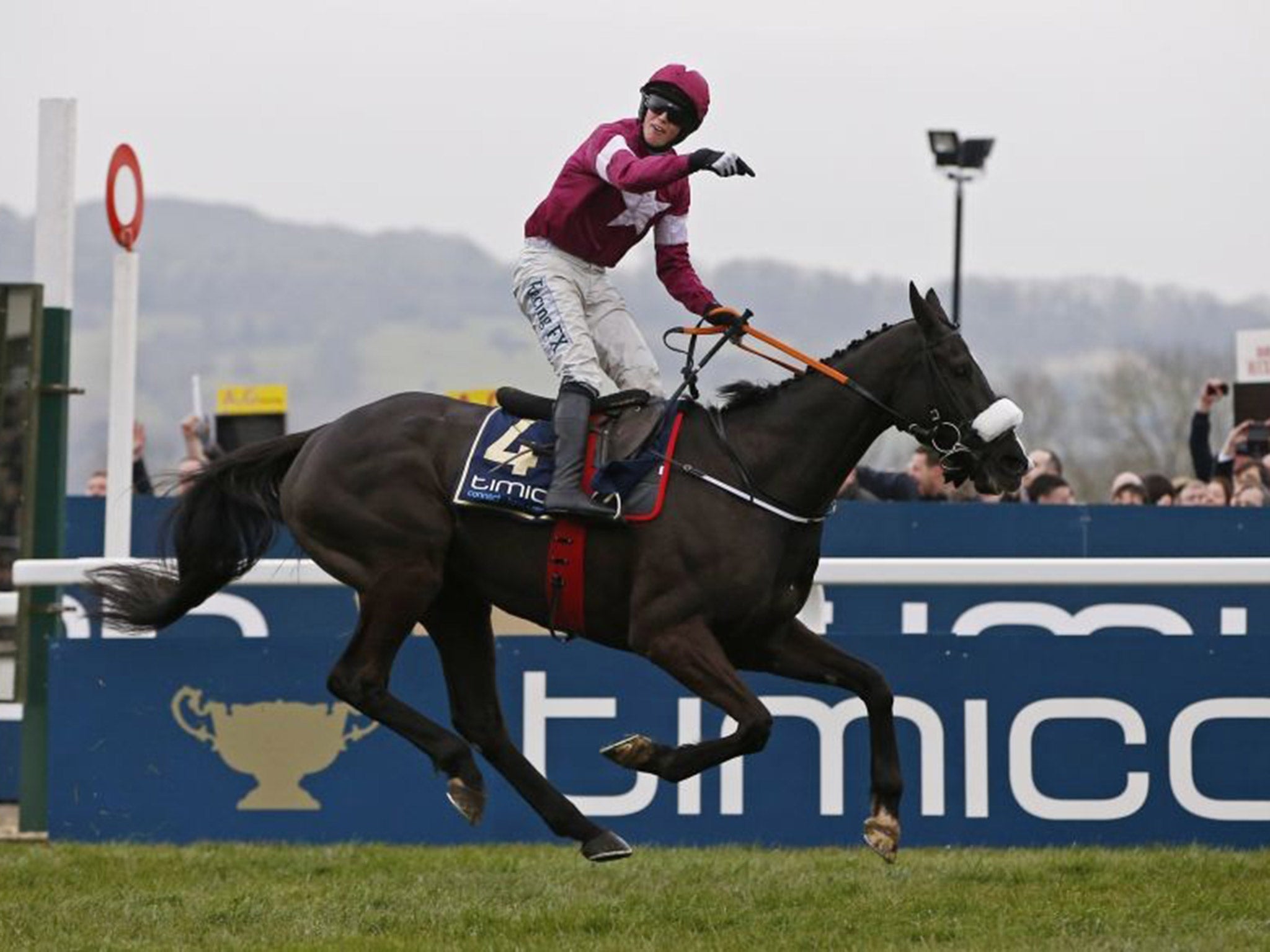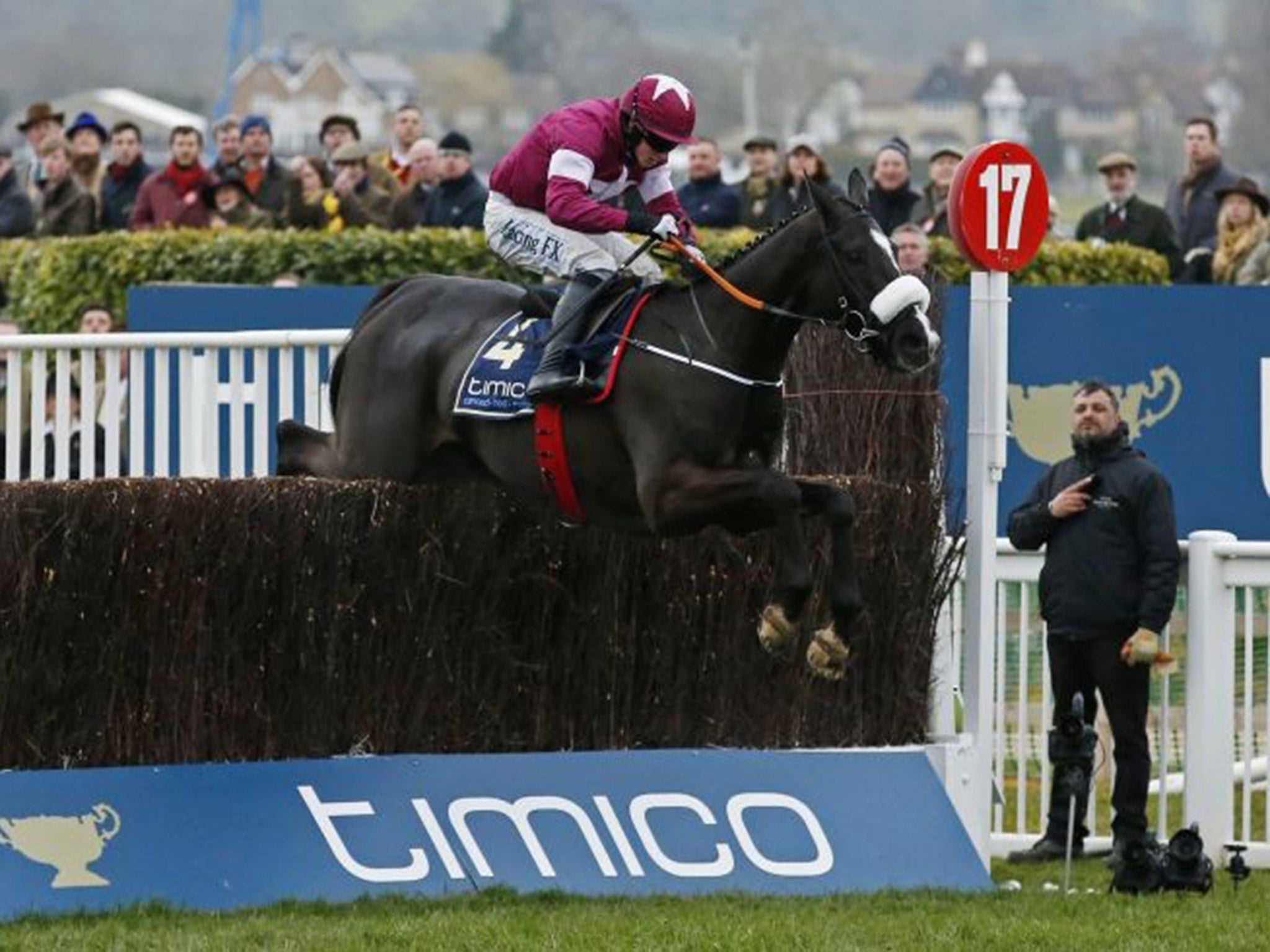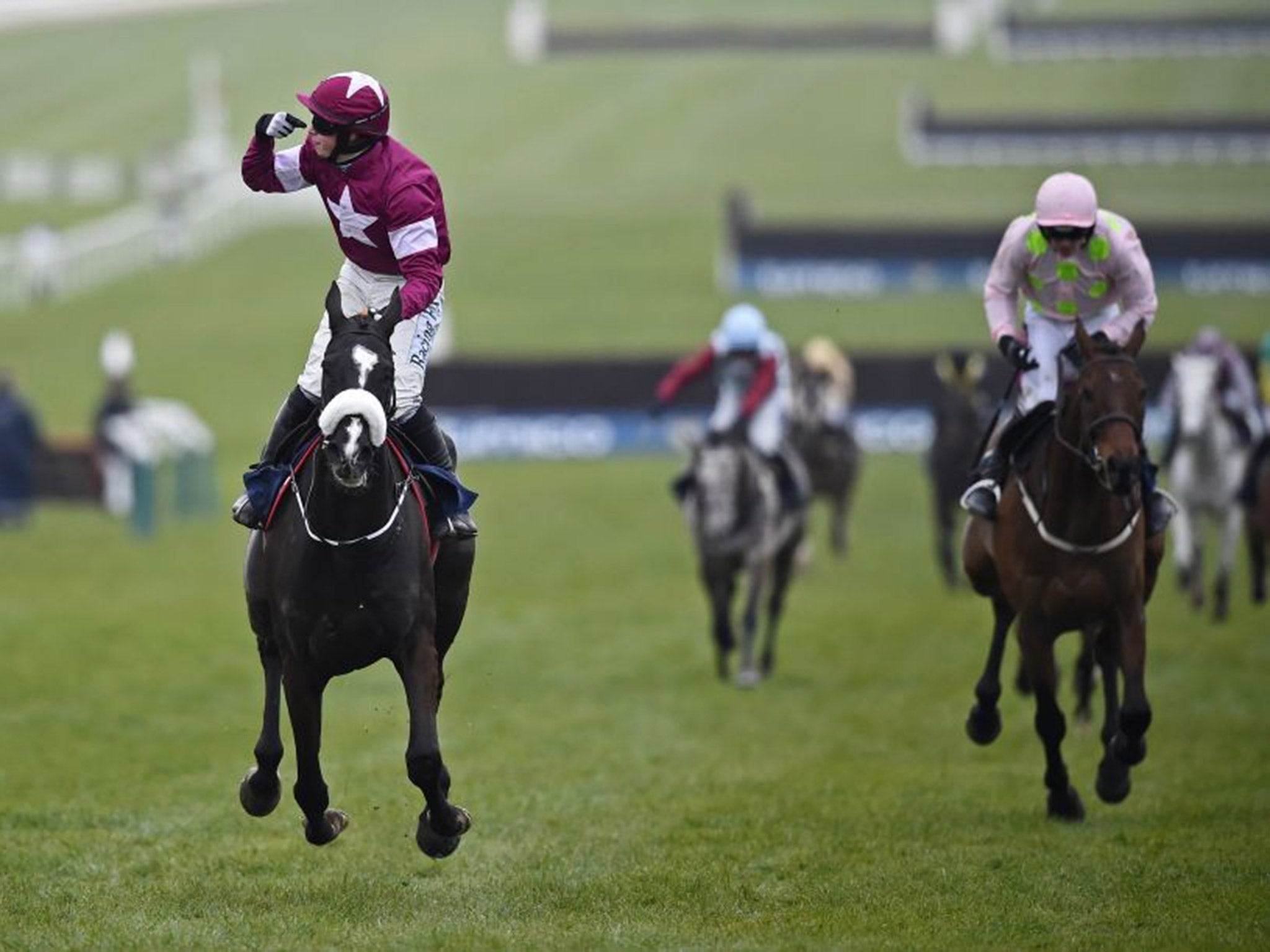Cheltenham Gold Cup 2016: Cue Card's collapse opens golden door for Cooper and Don Cossack
Tizzard runner misjudges jump, allowing young Irish jockey to hold off Walsh challenge and claim glory in the Gold Cup

Your support helps us to tell the story
From reproductive rights to climate change to Big Tech, The Independent is on the ground when the story is developing. Whether it's investigating the financials of Elon Musk's pro-Trump PAC or producing our latest documentary, 'The A Word', which shines a light on the American women fighting for reproductive rights, we know how important it is to parse out the facts from the messaging.
At such a critical moment in US history, we need reporters on the ground. Your donation allows us to keep sending journalists to speak to both sides of the story.
The Independent is trusted by Americans across the entire political spectrum. And unlike many other quality news outlets, we choose not to lock Americans out of our reporting and analysis with paywalls. We believe quality journalism should be available to everyone, paid for by those who can afford it.
Your support makes all the difference.Some had looked at the jockey and wondered whether it might all be too much, too soon. No longer. Not Victoria Pendleton – albeit she could barely have vindicated her contentious fast-tracking to greater effect than she did, storming into a close fifth over the same course just 40 minutes later – but the young man whose success in the Cheltenham Gold Cup consummated a historic, four-day celebration of Irish horsemanship.
Bryan Cooper first took a winner into the unsaddling enclosure here back in 2004, when he presumably had to sneak a day off from primary school. Looking at his flushed, cherubic features as he rode Don Cossack back into the same hallowed amphitheatre, he still looked closer to 11 than 23. But the highs and lows he has already compressed into his riding career would amply qualify him to share the grey hair and drawn features of Ruby Walsh. As such, not least by beating the leading rider in Festival history into second on Djakadam, this represented an unmistakable coming of age.
Yet it may well be that Cooper’s whole career will be sustained by impetus gained in a split second at the third last fence. Smad Place had set an exuberant tempo in front, Cooper and Walsh both keeping their mounts handy; and while Davy Russell would seldom be disposed to expose a horse to that kind of pace, the fact that Don Poli had so much to do entering the final circuit sooner reflected an inability to keep up on the drying ground. But here was Cue Card, the hope of the West Country, with a £1m bonus on the line after winning the first two legs of a Triple Crown Challenge set up by the Jockey Club.

Having struggled for rhythm during the race, Cue Card had seized hold of the bridle again to join issue with Don Cossack and Djakadam as Smad Place was plainly about to crack. The grey Cotswold afternoon filled with a roar of anticipation: three of the four big fancies were entering the defining moment of the race side by side, all guns blazing. And then the din obtained a new, desperate pitch: Cue Card had barely taken off, plunging through the birch and rolling horribly on landing. Happily, he leapt straight to his feet, and all eyes swivelled forward to the two remaining protagonists: Walsh, the doyen, and Cooper, the young pretender.
As Willie Mullins said afterwards, if anything Djakadam jumped the last two fences better than the winner – and he accordingly acknowledged that he had, for the sixth time in the one race he cannot nail, just found one two good. There were four and a half lengths in it, at the post, with Don Poli completing yet another Irish podium 10 lengths away. “I couldn’t believe how easy I was going turning for home,” Cooper said. “And when he got to the front he had his ears pricked and wasn’t doing a stroke.”
As a lad Cooper had led up Total Enjoyment, winner of the bumper for his father – one of so many Irish trainers who ply their trade, on a humbler scale, with the same ancestral intuition that underpins the unprecedented omnipotence of Walsh and Mullins. It was very soon evident, however, that he had an exceptional gift even by the standards of his country. Mentored by the late Dessie Hughes, even as a 7lb claimer Cooper was being touted around the Irish circuit as a Walsh in the making. The felicity of his seat and preternatural tactical nerve had become so obvious by the time he rode three winners here in 2013 that Cooper, barely fledged, was head-hunted for one of the most demanding jobs in the sport.

As retained jockey to Gigginstown Stud, he would be riding some of the most expensive jumpers around in the silks of the Ryanair chief execuitve, Michael O’Leary. But at his first Festival in the post Cooper broke a leg, so badly that the Turf Club doctor said that he had never seen the like. Then last year he suffered a parallel psychological mangling, winning the RSA Chase on Don Poli but subjected to excoriating criticism – and not merely from ignorant punters, but also from some in the inner circle – after defeat on Don Cossack in the big chase sponsored by his employer.
In having to choose between those same two horses in the Gold Cup, then, Cooper knew that he was approaching a definitive crossroads. Indeed, the horse he rejected was to be ridden by his predecessor, the contrastingly seasoned Russell. And if he felt comforted in his choice, when Don Cossack strode so majestically into the parade ring, he needed only look at Russell, in his own posse, to be reminded of the immensity of the task ahead. For Don Poli was one of three runners trained by Mullins, a living legend still to win a Gold Cup. And next to him stood Walsh, in those same pink-and-green silks he had worn in winning five championship races at the meeting already. Cooper, in contrast, had been obliged to wait for a handicap the previous day to give his employer a first dividend from an investment at least commensurate with that made by Rich Ricci.
Nor could it console him that Walsh’s breeches were still smeared green and brown after a harrowing experience in the previous race, when one of Ricci’s most promising youngsters had broken a leg while galloping innocuously between hurdles. If any race could give rise to such unaccountable catastrophe, how much more damage might Cooper invite through any errors in his own judgement?
He exuded corresponding relief afterwards. “We put all the doubters in their place today, all the people who said I didn’t get on with the horse,” he said. “I can’t thank Michael enough. From the time I broke my leg here, they have supported me all the way. Ruby and Davy have ten to 15 years ahead of me, but they’ve been very good to me, telling me to keep your chin up and train hard. Maybe there were one or two that got away last year, but we’re a year older, a year wiser, and supported by a great team.”
Mouse Morris, who trained War Of Attrition to win the race for Gigginstown in 2006, was on hand to offer his own seasoned endorsement. “It’s a pressure job but Bryan has a very good racing brain,” he said. “He didn’t get flustered through the week, he kept his cool, and he was very mature out there today.” There is no vacancy here, to be sure: not even Pendleton need apply.
Results:
1. Don Cossack (9/4F)
2. Djakadam (9/2)
3. Don Poli (9/2)
Join our commenting forum
Join thought-provoking conversations, follow other Independent readers and see their replies
Comments